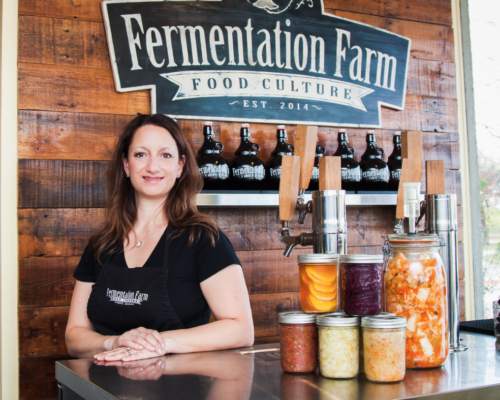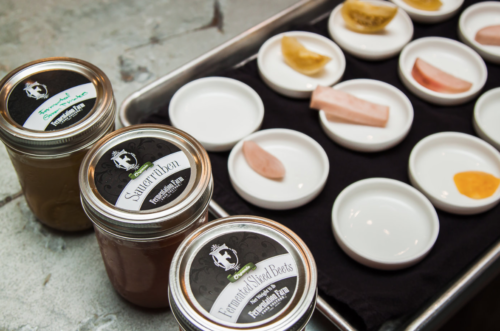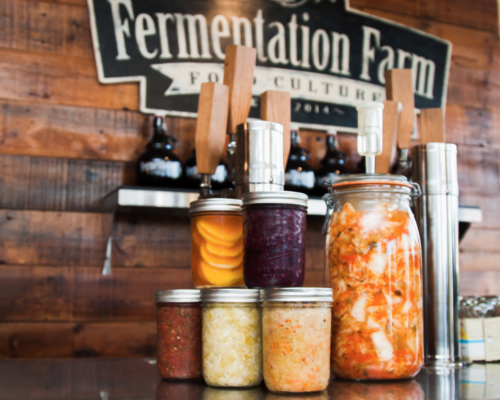How to Heal Your Gut: GC Explores Fermentation Farm
After working as a Chiropractor in Newport Beach and hearing the echoes of patients with digestive issues, Yasmine Mason, DC, launched Fermentation Farm— a haven for the those with Crohn’s Disease, cancer, leaky gut, irritable bowel syndrome, as well as a preventive food farm-acy for those who uphold the theory of gut-brain connection.
Today the members-only business in Costa Mesa, California proudly boasts 4,500 members since Fermentation Farm’s establishment two years ago. “My inspiration came from Elaina Luther, who had a shop called Culture Club 101. She offered classes that taught people how to ferment, and she was really the only one around doing it,” Mason explained. But since it was a two-hour drive from Orange County, patients weren’t eager to commute all the way there just to buy sauerkraut. Mason recommend that they bring the science and art of fermentation into their own home, as she continues to encourage her customers to do today. “It’s a huge passion of mine to teach others how to care for themselves and get better,” she told me. “So many people have said ‘Oh you’re going to put yourself out of business, and au contraire…”
Mason’s curiosity for science and food began as a little girl. Born in Horsham, south of London, to a Filipino father honing his skill set at culinary school and a French mother (hailing from a culture famous for its fermentation; think wine, champagne, salami, cheese, and sourdough)— her palette was formed by foodies.
When her family moved to rural Nevada when she was five, her father began working as a chef in Las Vegas, farming meat, vegetables, and fruit at their home. “We hardly ever bought vegetables from the store. We would just pick what we grew and eat it for dinner,” she explained. “We ate seasonally with what our home provided. As a passion, my Dad raised 60-pound sucklings for parties and Filipino luau’s.” Mason and her sisters fed the pigs, played with them, and even sprayed them down so they could play in the mud whenever it was unbearably hot. This is where her fascination with food and biology flourished.
Launching a “Ferm Farm” was always of interest to her, but in 2014, with both kids in school, it finally became feasible. To date, Mason and her knowledgable staff produce 500 pounds of fermented vegetables every week, and 550 gallons of kombucha every three weeks. GC attended her Fermenting Veggies course, accessible to all members (at 30 to 50 dollars pending upon the class) because education is truly at the forefront of their mission, and walked away with lacto-fermented beet kraut, garlic kraut, and a new vernacular and understanding for what fermentation is all about.
Lacto-Fermentation vs. Pickling
Gut health is all about the balance of good and bad bacteria. The reason that fermented veggies are beneficial for your gut is because they are preserved with lactic acid bacteria. This beneficial bacteria is created through an anaerobic process, meaning free of air. Vitamin B, C, K, probiotics, minerals, electrolytes, and organic acids (such as carboxylic) are the byproduct of this scientific reaction. When you pickle something, it means you are adding a preservative. A great example of this is commercial pickles, which are cucumbers that have been preserved in vinegar and thus lack the enzymes of fermented veggies. Fermented dill pickles, on the other hand, require 3 pounds of pickling cucumbers, 2 quarts of water with 1/4 cup sea salt; 1 tablespoon of allspice, mustard seed, coriander seeds, and peppercorns; 4 cloves of garlic, 4 slices of ginger, 4 bay leaves, 4 sprigs of fresh dill (flowering), and 4 grape leaves in a fermenting crock at room temperature for five days– this is what the process of making them requires. The resultant juice, otherwise referred to as the brine, is probiotic treasure. This is how we farm good bacteria.
“Every natural health practitioner wishes that their patients would eat fermented foods on a regular basis,” Mason stresses to me. “Getting the gut lining [up to par] is the path to good health,” she adds. “That’s why collagen in bone broth is important– it heals leaky parts of the gut that are cracked open because of chronic inflammation. Everything we make here has a purpose.”





































